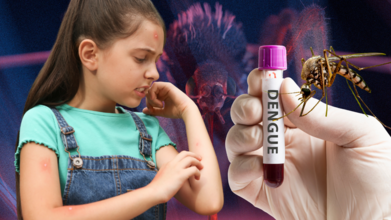- Health Conditions A-Z
- Health & Wellness
- Nutrition
- Fitness
- Health News
- Ayurveda
- Videos
- Medicine A-Z
- Parenting
- Web Stories
Can Aspirin Prevent Cancer From Spreading?

Credits: Canva
Not too long ago, a breakthrough study on aspirin came up. It was on aspirin therapy being used to prevent heart attack. Aspirin belongs to a class of medications called salicylates, known for their anti-inflammatory and blood-thinning properties. By preventing blood clots from forming, aspirin reduces the chances of blocked arteries, which can trigger heart attacks and strokes. That’s why doctors often recommend low-dose aspirin therapy to people with a history of cardiovascular disease or high-risk conditions.
But, do you know that the same medicine can also prevent some cancers from spreading? Scientists have uncovered how aspirin might help reduce the spread of certain cancers by boosting the immune system. The findings were published in the journal Nature, titled, Aspirin prevents metastasis by limiting platelet TXA2 suppression of T cell immunity. The findings could support the ongoing clinical trials and pave the way for more targeted use of aspirin in cancer treatment. This discovery can also now contribute to developing new drugs which are aimed at preventing cancer metastasis.
What Do We Know?
There have been previous studies which has shown how people who consume aspirin on a daily basis tend to have a lower risk of cancer spread. This works especially in breast, bowel and prostate cancers. However, researchers were unsure on how it actually played the role. This new study thus helps in finding that link and is conducted by the researchers at the University of Cambridge.
Cancer starts in one location, but in about 90% of cases, death occurs when it spreads to other parts of the body. Scientists have been studying the immune system’s role in this process, as cancer cells that detach from the main tumor are vulnerable to immune attack. While primary tumors can suppress the immune system, individual cancer cells that travel through the body are often more exposed, making them potential targets for treatment.
In a previous study, researcher screened 810 genes in mice and found that 15 of them influenced cancer metastasis. The researchers were able to discover that mice lacked a gene responsible for producing a protein called ARHGEF1 had fewer metastases in lungs and liver. The research also showed that ARHGEF1 suppresses T cells, which are immune cells that play an important role in killing metastatic cancer cells.
What Is The Link Between Aspirin And the Immune System?
To develop successful treatments, researchers sought a way to disrupt ARHGEF1's suppressive functions. They identified that ARHGEF1 activates when T cells interact with the clotting factor thromboxane A2 (TXA2). This was a surprising finding, given that TXA2 is already well-known for its function in blood clotting and aspirin action.
Platelets produce TXA2, which aids in blood clotting but can also cause heart attacks and strokes. Aspirin reduces TXA2 production, preventing excessive clotting. According to recent research, aspirin lowers TXA2 levels, allowing T cells to target and kill cancer cells before they spread.
In order to confirm the findings, the researchers then conducted experiments in mice with melanoma. This is when they found that when the mice was given aspirin, it had few metastases compared to the mice who was not administered with the same. This effect was directly linked to the release of T cells from TXA2 suppression.
Professor Rahul Roychoudhuri, the lead researcher, highlighted that many early-stage cancer patients undergo surgery or other treatments that could potentially cure them. However, some later experience cancer recurrence due to micrometastases—small clusters of cancer cells that have spread but remain dormant. Targeting this vulnerable stage could help prevent cancer from returning.
5 Proven Ways to Keep Dengue and Malaria at Bay This Season

Credits: Canva
While we are busy romanticising the rains, mosquitoes have already made their seasonal comeback. Dengue and malaria thrive during this time of year, and as the monsoon season brings much-needed relief from the summer heat, it also creates the perfect environment for the spread of mosquitoes, waterborne diseases, and skin infections.
Here are five tried-and-tested ways to keep dengue and malaria firmly at bay.
1. Clear Standing Water
Mosquitoes love existing in standing water. “Mosquitoes that spread dengue and malaria breed in standing water, even in tiny amounts like water in flowerpots, old tyres, buckets, or coolers,” explains Dr Rakesh Gupta. Which means that puddle on your balcony or that forgotten bucket in the corner could be a five-star mosquito maternity ward.
Both Dr Gupta and Dr Gowri Kulkarni agree on this as the most crucial preventive step. “Even the smallest pools of water, in flowerpots, discarded tyres, clogged drains, or air coolers, can serve as breeding grounds,” says Dr Kulkarni. The solution lies in a weekly routine check. Empty pet bowls, clean roof gutters, cover storage tanks, and if you have air coolers, dry them regularly. Your small efforts can literally break the mosquito life cycle.
2. Repel, Block, and Net Them Out
Mosquitoes prefer early mornings and late afternoons to feed on blood. Which is why repellents are not just optional; they are survival tools. Use creams, sprays, patches, or bands consistently.
“At night, always sleep under mosquito nets,” advises Dr Gupta. In fact, if you have babies or elderly family members, or if you are pregnant, nets become non-negotiable. Treated nets offer extra protection, so think of them as your double lock against intruders.
Dr Kulkarni adds that protection can be layered. “Prioritise protection from mosquitoes by using repellents, installing mosquito nets or screens, and wearing long-sleeved clothing during dawn and dusk when mosquito activity peaks.” Consider it your personal armour against the monsoon’s most persistent pests.
3. Cover Your Body
This season, ditch the mosquito-friendly wardrobe. Loose, long-sleeved shirts and full-length trousers are in; short sleeves and shorts are out. Mosquitoes love dark colours, so light shades are your best bet. Lighter clothes also keep you cooler in humid weather.
“If you can, tuck your shirt into your pants and your pants into your socks,” suggests Dr Gupta.
4. Clean Surroundings, Clear Conscience
A cluttered, damp home is practically an invitation for mosquitoes and skin infections to move in. “A clean and dry environment makes it harder for mosquitoes to breed,” says Dr Gupta. His advice is to keep kitchens tidy, avoid damp laundry lying around, and if you are using air coolers, empty and dry them often.
Dr Kulkarni emphasises the role of community action too. “Dengue and malaria prevention cannot be achieved in isolation. Coordinated neighbourhood clean-up drives, public awareness campaigns, and active involvement of local bodies make preventive efforts more effective and long-lasting.”
5. Boost Your Inner Defences
Of course, even the best mosquito-prevention tactics can fail if your immunity is running on low battery. Dr Gupta recommends a monsoon-friendly diet. “Eat plenty of seasonal fruits and vegetables, especially those with natural immunity-boosting properties like papaya, jamun, ginger, garlic, and turmeric.”
And do not forget the basics, like drinking only boiled or filtered water, skipping dubious street food, and washing fruits and vegetables thoroughly. After all, the last thing you want while dodging dengue is a waterborne stomach infection.
Do Not Ignore the Warning Signs
Despite your best efforts, if you develop a high fever, severe body aches, persistent headache, or unexplained fatigue, do not brush it off as ‘just the weather’. Dr Kulkarni cautions, “High fever, body aches, persistent headache, or unexplained fatigue should never be ignored during this season. Early medical advice can prevent complications and greatly improve recovery.”
Staying safe during the monsoon is all about balance. Enjoy the rains, but keep an eye on puddles. Relish the weather, but do not forget your mosquito repellent. As Dr Gupta sums it up, “Small preventive actions taken every day not only protect you but also help in keeping your community healthier through the season.”
Wearing Contact Lenses This Monsoon? Here Is What Eye Doctors Want You to Know

Credits: Canva
Monsoons are more than just good, hot food. And while most of us are quick to pull out umbrellas and raincoats, very few think about protecting our eyes, especially if we wear contact lenses. And according to eye specialists, this oversight could cost us more than just a little irritation.
Why Your Eyes Are at Risk in the Rainy Season
The humid climate during the rainy season creates the perfect environment for viruses to thrive. On top of that, people tend to spend more time indoors and in close contact with one another, which raises the risk of viral infections spreading by nearly 50 per cent. Add to this the common flu, which weakens immunity, and your eyes become more vulnerable than ever.
Contaminated water is another culprit. Dr Jayapratha Selvaraj, General Ophthalmology, points out that poor water hygiene can worsen eye conditions such as conjunctivitis (commonly known as pink eye) and keratitis, an infection of the cornea. “These infections are especially troublesome for people who wear contact lenses,” she says.
Dr Venkatesan C, Senior Consultant – Ophthalmology, agrees, adding that fungal and bacterial keratitis become more common during the monsoon. “They may start with redness, irritation, or pain, but if not treated right away, they can cause serious visual problems,” he warns.
Contact Lens and Monsoon
Contact lenses are a blessing for millions, particularly students and professionals who find glasses cumbersome. But during the monsoon, they can turn into little traps for germs.
“Contact lenses are safe if you follow the rules. But the moment hygiene slips, lenses can let bacteria or fungi stick to the eye’s surface,” says Dr Venkatesan. The moist, humid environment during the rainy season accelerates this risk. Tears dry more slowly in such weather, keeping the surface of the eye damp, a perfect breeding ground for infections.
Students, in particular, face greater danger. Many wear their lenses for long hours, share lens solutions with friends, or even swim in pools or rainwater while keeping their lenses on. Each of these habits, says Dr Venkatesan, can drastically raise the risk of infection.
Golden Rules of Lens Care in the Rainy Season
You do not have to abandon your lenses every time it rains. With the right care, you can enjoy both the rain and clear vision.
Dr Selvaraj lists the basics:
- Wash your hands thoroughly before touching or wearing lenses.
- Store lenses only in their designated case.
- Never use expired lenses.
- Avoid rinsing or storing lenses in tap water or saline; always use proper lens solution.
- Do not sleep, bath, or swim with lenses on.
Dr Venkatesan adds a few more monsoon must-dos:
- Always use fresh lens solution; never top up old liquid in the case.
- Take off your lenses before going out in the rain.
- If your doctor has not recommended it, do not sleep in your lenses.
- If you notice persistent redness, discharge, or blurred vision, remove your lenses immediately and see an eye doctor.
When Infections Happen
Despite best efforts, sometimes you still get infections. Viral conjunctivitis, for example, often resolves on its own, but that does not mean you should ignore it. “Ophthalmologists may prescribe antibiotic and lubricant eye drops to reduce discomfort and prevent spread,” explains Dr Selvaraj.
If the cornea gets involved, as in keratoconjunctivitis, timely medical treatment becomes crucial. Viral eye infections can remain contagious for up to two weeks, so doctors urge patients to:
- Wash hands frequently.
- Avoid sharing towels, bed sheets, or handkerchiefs.
- Resist rubbing or touching the eyes.
- Switch to glasses and only return to contact lenses after medical clearance.
You do not have to give up your lenses during monsoon, but you do have to respect the hygiene rules. Even a small slip-up, like rinsing lenses in tap water or wearing them during a sudden downpour, can lead to painful infections and, in some cases, long-term vision loss.
As Dr Venkatesan puts it, “You may enjoy the beauty of the rainy season without hurting your eyes if you take basic steps and get medical care right away.”
This Contact Lens Health Week 2025, know that your eyes deserve as much protection as your clothes and shoes. And when it comes to contact lenses in the monsoon, a little extra care goes a very long way.
Dr Jayapratha Selvaraj is an ophthalmologist at Dr Agarwal's Eye Hospital, Chennai
Dr Venkatesan C is a senior ophthalmology consultant at SRM Global Hospitals, Chennai
Bubonic Plague Changed The Human Immune System, Here's How

Credits: Canva
After the California bubonic plague case, where a resident who went camping at South Lake Tahoe area tested positive for plague, lot has been talked about the disease. The bubonic plague is often remembered as one of the deadliest pandemics in human history.
Today, with the California resident case, we all know that it still lingers in scattered regions, but antibiotics make it far less threatening.
What is less widely known is that the plague may have permanently altered human biology, leaving an imprint on the immune system that persists even now.
Also Read: Bubonic Plague California Resident: Here's All That You Need To Know About The Disease
The Bacterium Behind the Plague
The plague is caused by Yersinia pestis, a rod-shaped bacterium carried by fleas that thrive on rodents and other wild animals. While unremarkable in appearance under a microscope, this microbe has shaped centuries of human history. At its peak during the 14th century, the Black Death killed tens of millions across Europe, with entire towns and communities wiped out in a matter of months.
Earlier outbreaks of plague are believed to stretch back thousands of years, with traces of the bacterium found in ancient human remains. Yet the medieval Black Death was unlike anything before, spreading rapidly through trade routes and devastating Europe within a few short years.
Natural Selection in the Wake of the Black Death
The scale of mortality during plague outbreaks raised an intriguing question: could survival have been influenced by genetics?
If certain individuals carried genetic variations that helped them fight off the infection, those traits might have been passed on to their descendants. In essence, the plague may have acted as a brutal filter, altering the genetic makeup of future generations.
Modern genetic studies now provide evidence for this idea. By comparing DNA from plague victims with that of later populations, researchers have observed that people who lived through the plague era and passed on their genes tended to carry variants that supported stronger immune defenses. This suggests that the catastrophe of the Black Death created a surge of natural selection across affected regions.
Unlocking Clues from Ancient Bones
For a long time, studying the genetic impact of plague was extremely difficult. DNA preserved in centuries-old skeletons is often degraded and contaminated by soil and microbes. However, advances in ancient DNA sequencing opened new doors.
Scientists discovered that the inner ear’s bony labyrinth, one of the densest parts of the human body, preserves intact DNA remarkably well. Extracting genetic material from this area has allowed researchers to examine how plague survivors may have differed from those who succumbed.
With these methods, mass graves of plague victims have become key resources for understanding how the disease influenced human biology. By sequencing genomes from skeletons buried before, during, and after outbreaks, scientists can track changes across generations.
The Role of HLA Genes
One of the clearest examples of plague-driven selection lies in the human leukocyte antigen (HLA) system. This group of genes is essential for immune defense, helping the body recognize and destroy cells infected by pathogens. Even subtle differences in HLA variants can determine whether someone is more resilient against a particular disease.
Evidence suggests that during the plague years, people carrying certain HLA variants were more likely to survive. These protective versions of the genes became more common in descendants over time. This mirrors what scientists have observed in more recent pandemics, such as Covid-19, where some people showed natural resistance thanks to genetic variations in immune-regulating genes.
A Gene Called ERAP2
Another key discovery centers on a gene known as ERAP2. This gene produces a protein that helps immune cells break down foreign invaders, including bacteria like Yersinia pestis. Researchers studying remains from plague cemeteries in London and Denmark found that individuals who carried a particular version of ERAP2 were twice as likely to survive the Black Death.
By the end of the 14th century, this protective variant had become widespread among Europeans, appearing in roughly half the population in London and even more frequently in Denmark. It is one of the strongest pieces of evidence showing how a pandemic can reshape human genetics in just a few generations.
Balancing Benefits and Risks
However, the story is not entirely one of benefit. Genes that protect against deadly infections may also carry hidden costs.
For example, some of the same immune-system variations that helped ancestors survive plague outbreaks are now associated with autoimmune disorders, where the immune system mistakenly attacks healthy tissue. This illustrates the trade-offs of evolution: what once ensured survival may create vulnerabilities in a very different modern environment.
Why More Research is Needed
While the genetic evidence is compelling, scientists caution that we are only beginning to understand the full scope of plague’s impact. To get a clearer picture, thousands more ancient genomes from across Europe and Asia need to be analyzed. Only then can researchers determine how widespread these adaptive changes really became.
There is also debate over whether plague was the most significant driver of immune evolution. Diseases like smallpox, which persisted for centuries and claimed hundreds of millions of lives, may have exerted an even greater influence. The challenge is teasing apart the effects of different pathogens across different time periods.
What To Remember
You May Like To Read: What History Teaches Us About Plague? Are There More Than One Type?
Despite its reputation as a medieval killer, plague has not disappeared. Small numbers of cases are still reported each year in parts of the world, from the western United States to Madagascar. Thanks to antibiotics, survival rates are far higher today, but the fact that the disease persists is a reminder of its enduring presence in nature.
Rodents and fleas continue to serve as reservoirs for Yersinia pestis. Outbreaks in isolated communities highlight the delicate balance between human society and the microbial world. While the scale of devastation seen during the Black Death is unlikely to return, the evolutionary lessons it left behind remain relevant.
Centuries later, the legacy of plague survives in our DNA. Some of the same genetic defenses that once meant the difference between life and death still influence how our immune systems function today.
© 2024 Bennett, Coleman & Company Limited

